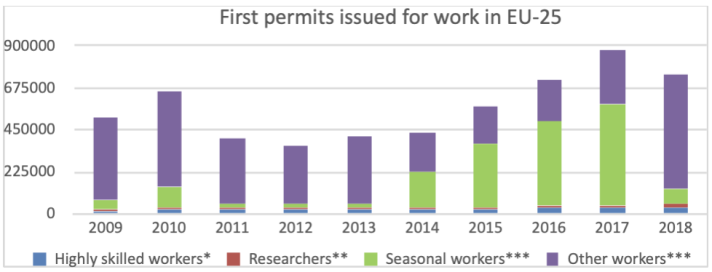The Single Permit Directive, adopted in 2011, establishes a simplified application procedure and one single permit for both the right to work and stay in the EU.
The Directive also gives many non-EU nationals working in the EU the right to be treated equally to EU nationals in many respects, including:
- working conditions
- social security
- recognition of qualifications
- tax benefits
Directive rules cover most non-EU workers, whether admitted to an EU country for work according to national rules. Persons admitted for other reasons, such as family reunification, are covered for equal treatment, if they work. Some non-EU nationals are excluded from the Directive such as seasonal workers and posted workers.
The Directive applies in 25 EU countries (but not in Denmark and Ireland).
More information on the key provisions of the Directive are available in the Summary of EU legislation - Single Permit Directive.
On 27 April 2022, the European Commission adopted a proposal to revise the Directive.
The negotiations between the Council and the European Parliament are currently ongoing.
Objectives
- to ensure a simplified unique procedure for applying for the right to work and reside in the EU
- to give protection and fair treatment to the applicant in the application procedure
- to ensure that the non-EU national only needs one permit that gives the right to both work and residence
- to ensure that non-EU nationals working in the EU are not exploited as they are guaranteed equal treatment with nationals in terms of for instance working conditions, including pay, health and safety, trade union membership, social security, education and vocational training and tax benefits
How relevant is the Directive for labour migration to the EU
Each year, around 3 - 3.5 million non-EU nationals reside in the EU primarily for work. These workers help responding to the need for workers in the EU economies, which is not fully met by EU workers.
Source: Eurostat database [migr_ressoc] as of 1.10.2019.NB. Figures for 2018 are still preliminary. *Highly skilled workers are not reported separately in all Member States, and this statistic excludes EU Bluecard permits.. **Researchers are not reported as workers in all Member States. *** Poland reported large numbers of Seasonal workers between 2014 and 2017, some are reported as others in 2018 others as seasonal workers now when the Seasonal workers Directive applies fully.
The Single Permit Directive covers most other workers, highly skilled workers and as regards equal treatment researchers. This graph shows all permits issued (new or renewed) for different reasons since 2013.
Source: Eurostat database [migr_ressing] as of 1.10.2019.NB. *Figures for 2018 are still preliminary.
A recast Single Permit Directive
The proposed recast of the Single Permit Directive will make the application procedure for the single permit more efficient. It will enable applicants to apply for permits from both non-EU countries and Member States. Currently, the long duration of application procedures unencourages employers from international recruitment. Reducing this duration will help increase the EU’s attractiveness and address EU labour shortages.
The proposal also includes new requirements to strengthen the safeguards and equal treatment of nationals of non-EU countries as compared to EU citizens and improve their protection from labour exploitation.
Under the proposed new rules, the single permit will not be linked to one employer alone. This means that within the period of validity of the permit, workers will have the right to change employers while continuing to reside legally in the Member State. This will facilitate labour matching and reduce vulnerability to labour exploitation. Furthermore, the proposal includes new obligations for Member States to provide for:
- inspections
- monitoring mechanisms
- sanctions against employers breaking the rules
Policy timeline
- 2022
The Commission presented a proposal of the Recast Single Permit Directive. - 2020
The Communication on the New Pact on Migration and Asylum has announced a review of the Single Permit Directive which will look at ways to simplify and clarify the scope of the legislation including admission and residence conditions for low and medium skilled workers. - 2019
First implementation report of the Single Permit Directive.
The 2019 Fitness Check on Legal migration evaluated the legal migration Directives. - 2011
Adoption of the Single Permit Directive (2011/98/EU). - 2007
Proposal for the Single Permit Directive (COM(2007) 638) and its impact assessment (SEC(2007)1408 Volume I and Volume II).

